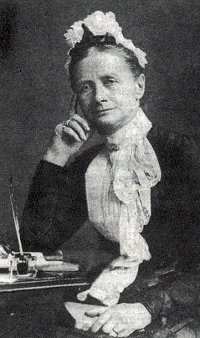Cecil Frances Alexander
| Cecil Frances Alexander | |
|---|---|
 Undated photograph of Cecil F. H. Alexander | |
| Born |
Cecil Frances Humphreys April 1818 Dublin, Ireland[1] |
| Died | 12 October 1895 (aged 77) |
| Nationality | Irish |
| Occupation | hymn-writer, poet |
| Notable work(s) | Hymns for Little Children |
For the novelist, see Annie French Hector, 'Mrs. Alexander'
Cecil Frances Alexander (Early April 1818, Ireland – 12 October 1895[2]), was a hymn-writer and poet.
Background
Alexander was born in Dublin, the third child and second daughter of Major John Humphreys (of Norfolk, land-agent to 4th Earl of Wicklow and later to the second Marquess of Abercorn), and Elizabeth (née Reed). She began writing verse in her childhood, being strongly influenced by Dr Walter Hook, Dean of Chichester. Her subsequent religious work was strongly influenced by her contacts with the Oxford Movement and in particular with John Keble, who edited one[3] of her anthologies. By the 1840s she was already known as a hymn writer and her compositions were soon included in Church of Ireland hymnbooks. She also contributed lyric poems, narrative poems, and translations of French poetry to Dublin University Magazine under various pseudonyms.[4]
Her book, Hymns for Little Children reached its 69th edition before the close of the nineteenth century. Some of her hymns, e.g. "All Things Bright and Beautiful", "There is a Green Hill Far Away" and the Christmas carol "Once in Royal David's City", are known by Christians the world over, as is her translation of “Saint Patrick's Breastplate”. She issued Verses for Holy Seasons (1846); The Lord of the Forest and His Vassals (1847; a children's allegory); and Hymns for Little Children (1848).
In Strabane in October 1850 she married the Anglican clergyman William Alexander, afterwards Bishop of Derry and Archbishop of Armagh. Her husband also wrote several books of poetry, of which the best known is St. Augustine's Holiday and other Poems. She was six years older than the clergyman, causing great family concern.[5]
Alexander was involved in charitable work for much of her life. Money from her first publications had helped build the Derry and Raphoe Diocesan Institution for the Deaf and Dumb, which was founded in 1846 in Strabane. The profits from Hymns for Little Children were also donated to this school. She was involved with the Derry Home for Fallen Women, and worked to develop a district nurses service. She was an indefatigable visitor to poor and sick.[6]
Seven hymns penned by Alexander were included in the 1873 issue of the Church of Ireland Hymnal, and eighteen of her works were contained in A Supplement to Hymns Ancient and Modern (1889). They continue to be well-accepted, as nine of her works were contained in both the 1960 and the 1987 editions of the Church of Ireland Hymnal. A posthumous collection of her poems was published in 1896 by William Alexander, titled Poems of the late Mrs Alexander. She is commemorated by an Ulster History Circle blue plaque in Bishop Street, Derry city.
Further reading
- A Green Hill Far Away: A Life of Mrs C.F. Alexander E.W. Lovell, 1970, Friends of Derry Cathedral.
| Wikisource has original works written by or about: |
References
- ↑ She was born at her parents' home, 25 Eccles Street, Dublin. http://orlando.cambridge.org/public/svPeople?person_id=alexce Cambridge.org website, page for Cecil Frances Alexander, accessed 5 February 2012
- ↑ A Short Biographical Dictionary of English Literature by John W. Cousin
- ↑ Hymns for Little Children
- ↑ Her "Burial of Moses" appeared anon. in Dublin University Magazine (1856) causing Tennyson to profess it one of the few poems of a living author he wished he had written. http://www.poemhunter.com/cecil-frances-alexander/biography/Poem Hunter website, page for Cecil Frances Alexander, accessed 5 February 2012
- ↑ Poem Hunter website
- ↑ Poem Hunter website
External links
| Wikiquote has a collection of quotations related to: Cecil Frances Alexander |
 This article incorporates text from a publication now in the public domain: Cousin, John William (1910). A Short Biographical Dictionary of English Literature. London: J. M. Dent & Sons. Wikisource
This article incorporates text from a publication now in the public domain: Cousin, John William (1910). A Short Biographical Dictionary of English Literature. London: J. M. Dent & Sons. Wikisource
- Cecil Frances Alexander, Ulster History Circle
- Cecil Frances Alexander at University of Toronto Libraries
|